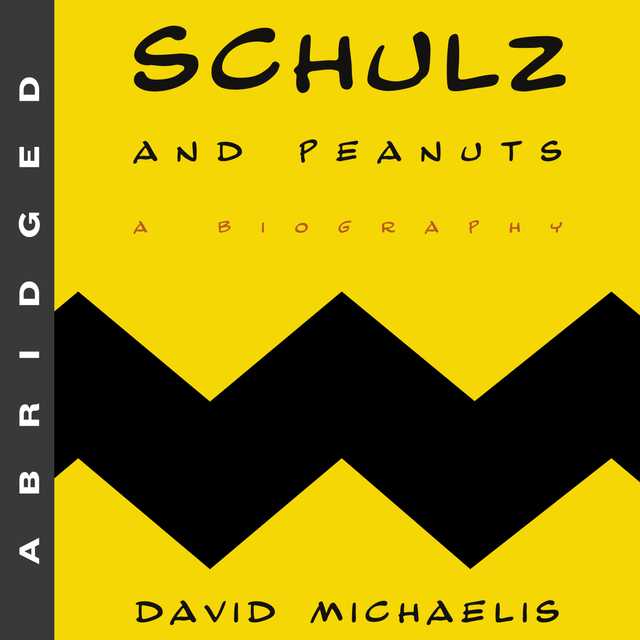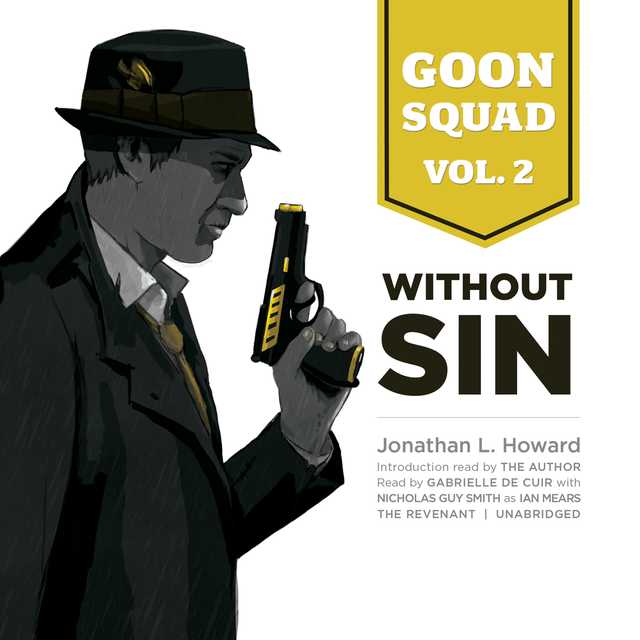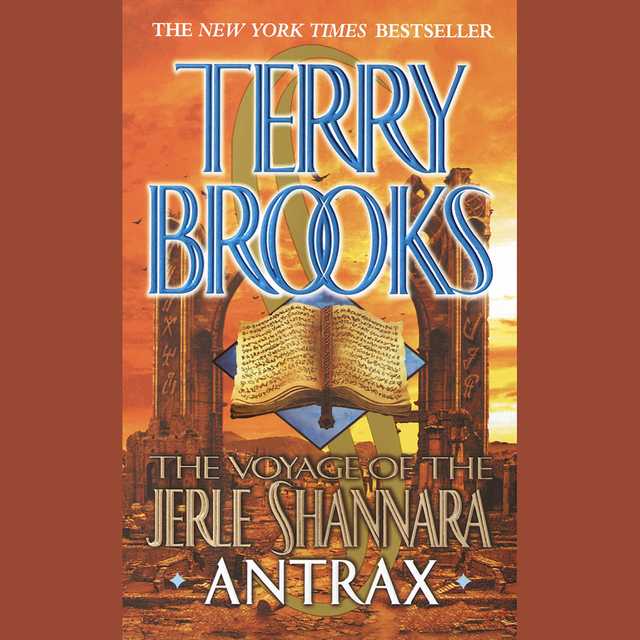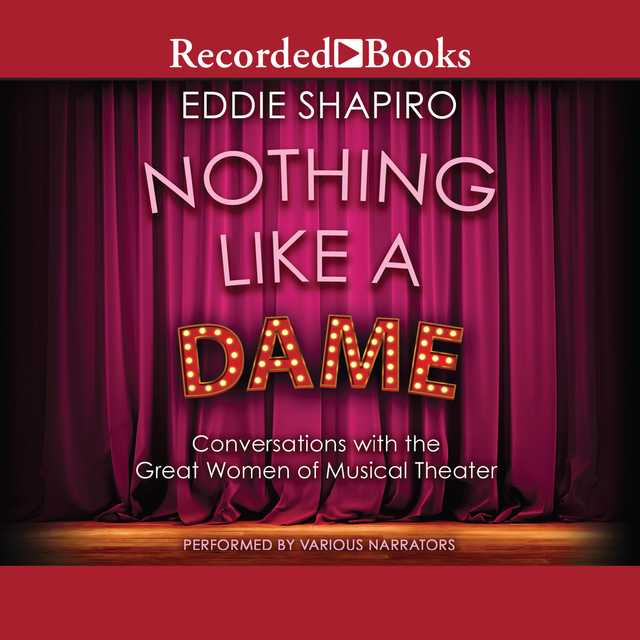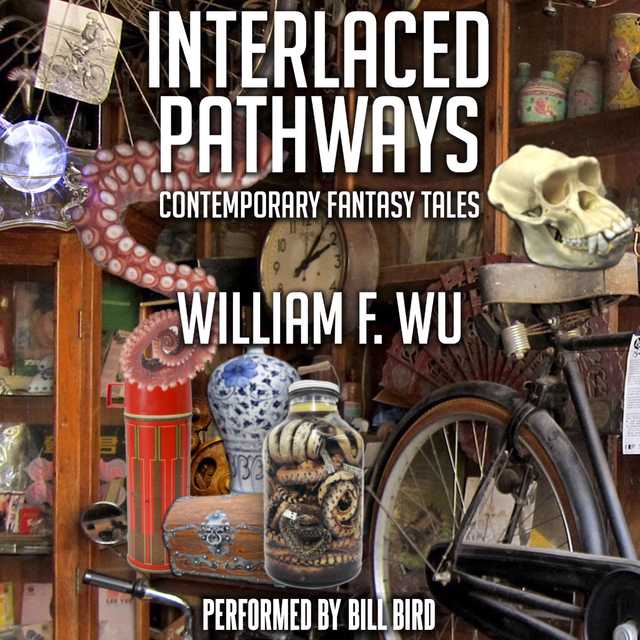Schulz and Peanuts Audiobook Summary
Charles M. Schulz, the most widely syndicated and beloved cartoonist of all time, is also one of the least understood figures in American culture. Now acclaimed biographer David Michaelis gives us an in-depth biography of the brilliant, unseen man behind Peanuts.
It is the most American of stories: How a barber’s son grew up from modest beginnings to realize his dream of creating a newspaper comic strip. How he daringly chose themes never before attempted in mainstream cartoons–loneliness, isolation, melancholy, the unending search for love–always lightening the darker side with laughter and mingling the old-fashioned sweetness of childhood with a very adult and modern awareness of the bitterness of life. And how, using a lighthearted, loving touch, and a cast of memorable characters, he portrayed the struggles that come with being awkward, imperfect, human.
Based on years of research, Schulz and Peanuts is the definitive epic biography of an American icon and the unforgettable characters he created.
Other Top Audiobooks
Schulz and Peanuts Audiobook Narrator
Holter Graham is the narrator of Schulz and Peanuts audiobook that was written by David Michaelis
David Michaelis is the author of two bestselling biographies, including N. C. Wyeth (available from Harper Perennial), which won the Ambassador Book Award for Biography and Autobiography, given by the English-Speaking Union of the United States. He lives in New York City.
About the Author(s) of Schulz and Peanuts
David Michaelis is the author of Schulz and Peanuts
More From the Same
- Author : David Michaelis
- Eleanor
- Publisher : HarperAudio
- Abraham
- American Gods [TV Tie-In]
- Dead Ringer
- House of Sand and Fog
- Prey
Schulz and Peanuts Full Details
| Narrator | Holter Graham |
| Length | 12 hours 44 minutes |
| Author | David Michaelis |
| Category | |
| Publisher | HarperAudio |
| Release date | October 16, 2007 |
| ISBN | 9780061554681 |
Subjects
The publisher of the Schulz and Peanuts is HarperAudio. includes the following subjects: The BISAC Subject Code is Artists, Architects,, Biography & Autobiography
Additional info
The publisher of the Schulz and Peanuts is HarperAudio. The imprint is HarperAudio. It is supplied by HarperAudio. The ISBN-13 is 9780061554681.
Global Availability
This book is only available in the United States.
Goodreads Reviews
Darren
June 28, 2008
Luciously readable, fascinating, and flawed account of the life of the creator of Charlie Brown. I first decided to read this book because of a massive roundtable featured in the latest issue of "The Comics Journal," the basic conclusion being that the book does the real-life Schulz no justice. (I read the book, and then read the roundtable.)Monte Schulz, the son of the great cartoonist, kicked off the roundtable with a massive essay that's divided into three parts: a brief memoir of his time and experience with David Michaelis, in which Monte spent much time and exchanged a number of emails with the biographer, to the point that he thought they had a genuine friendship (proving what should be an old adage, "Do not make friends with your father's biographer."); in part two, he lists the vast amount of grievances he has with the biography, indicating that he has many more and generally despising the entire tone of Michaelis' work; in part three, he provides a minute-by-minute description of his father's battle against, and eventual succumbing to, cancer.The general theme of Monte Schulz's essay is: His father was not a manic depressive paranoiac with vaguely Freudian issues, he was a kindhearted, swell guy who coached his sons' sports teams, enjoyed playing hockey with his friends at the rink his first wife built, and had a great family he was very close to.The problem with the Charles Schulz who appears in his son's essay is really the same problem with the Charles Schulz who appears in David Michaelis' book: namely, both Charles Schulz's are based half on reality and half on bullshit, or, more to the point, bullshit conceived by writers with an extremely one-note thesis about the life of Charles Schulz. The difference is that Michaelis' interpretation is interesting, and Monte Schulz's interpretation is almost pointedly boring. Michaelis turns Schulz into an essentially tragic figure, explicitly referencing "Citizen Kane" and "The Great Gatsby" - Monte Schulz turns his father into that particularly American figure, a normal everyday superhero father. Whichever interpretation you believe will probably depend largely on whether you think every man is an Atticus Finch or a Willy Loman.There are major failings in Michaelis' book, largely because there are so few failings in the books' opening chapters. In incredibly precise (and almost certainly heavily imagined) detail, Michaelis presents us with the youth of Charles Schulz, in the process visualizing a Depression-Era America which reads like an alien planet compared to the world we live in today. The book makes the argument that Schulz essentially wanted to be a cartoonist his whole life, and spent his first few decades following that dream.The problem is that he achieves that dream relatively early, and indeed, the dream was larger than he could have imagined. As "Peanuts" becomes a megahit, and then a marketing phenomenon, and then one of the real globally recognized brands on the planet, Schulz's life becomes too big, both for Schulz (who, even his son agrees, was somewhat agoraphobic) and for Michaelis. The later chapters present intriguing snippets - how "Peanuts" became a global brand, in the process radically altering advertising and practically inventing the notion of multimedia.The problem is that Michaelis is really just interested in Schulz, and his interior life, so all of this wild tumult fades to the background at the exact point when we want to learn more about it. Michaelis essentially brushes it all off by saying that Schulz was never really interested in all the other stuff, besides the strip, but that in itself needs more exploring. What did it feel like for this essentially lonely man to see his work everywhere, on everything - in blimps, on T-shirts, in advertisements, on TV and stage? Maybe the problem is that Schulz's life plays like a surrealist melodrama.However, there's another great failing with Michaelis' book, and this is also a failing shared by Monte Schulz's portrayal - it never takes us to Schulz's drawing table. Earlier in the book, Michaelis wonderfully describes the first time young Sparky Schulz saw original comic strip art, with all of the obvious corrections and blue ink marking where the word balloons should go, but curiously, after taking us within and behind the art form, Michaelis provides only a cursory examination of what cartooning is once Schulz becomes successful. We see how Schulz took incidents from his life and turned it into the strip, but we never quite get the sense of how and why and what it felt like.At one point in the book, Schulz engages in an affair with a much younger woman. Monte Schulz, and others in the panel, find it distasteful that Michaelis dwells for so long on this affair (it takes up much more space than the description of Schulz's second marriage, which took up about 5 billion percent more of Schulz's life.) The problem is that the younger Schulz doesn't really talk about it at all. This is understandable, since what kid wants to talk about his dad cheating on his mom, but it also proves that, as a biographer, Monte Schulz is just as unqualified AS Michealis, and with vastly less of a sense of what makes for an interesting read.Michaelis juxtaposes the affair against a series of strips in which Snoopy dreams about his sweetheart. The use of the strips to explicate and explore aspects of Schulz's life is an easy device which reaps huge dividends. At times, it's far too easy. At other times, it's genius. Yet even when it clearly reflects aspects of Schulz's life, there's an essential link in the chain missing. We're told that Schulz claimed to be not all that self-reflective - refusing to see a therapist, rarely talking about himself, claiming that he never used any aspects of his own life in his own writing. Yet clearly, Michaelis concludes, his own life was all over his writing. Okay, but then what about things that weren't taken directly from his life?Someone on the roundtable notes that Michaelis directs his gaze to just a few characters in the "Peanuts" case, and uses this fact to note Michaelis' forced perspective - purposefully leaving out details in order to prove his case. Okay, fine, but who really wants to read a book about Rerun, Franklin, Pig Pen, Spike the mustached Dog, and Frieda? Even if Michaelis' literary analysis is essentially one-note - Snoopy's in love, JUST LIKE SCHULZ! Charlie Brown plays baseball, JUST LIKE SCHULZ! - he gives a wonderful portrait of the creative evolution of the strip in its first few decades.Really, there are three biographies here, one excellent, one good, one awkward yet fascinating. The excellent one is the life of young Charles Schulz; the good one is first twenty-five years of Schulz's cartooning, juxtaposed against the rise and development of "Peanuts"; the awkward yet fascinating one is the story of Schulz beginning in his middle age, when he carried on a couple of affairs of the mind (and perhaps one genuine affair), lost one wife, gained a new one, slowly became happier and less interesting in the manner of all great artists who age away from their greatest creative spark. Michaelis' problem is that he mashes the three biographies together. His detractors' problem is that his story is much better, and feels far truer, than theirs.
Carol
June 22, 2017
Charles M. Schulz was more than a cartoonist -- he was an American original, one of those profoundly revolutionary individuals who erases an entire art form and reinvents it in his own image. The way Babe Ruth transformed baseball, the way Elvis Presley transformed popular music, the way Clint Eastwood transformed the American western, the way H.P. Lovecraft transformed modern horror, Schulz transformed the American comic strip. Before Schulz, all was darkness and slime. Brenda Starr's drooling over international orchid smugglers. Terry and the Pirates are beating up helpless Rickshaw Men. Comic strips are all muscle flexing and B movie sexual innuendo, with an occasional POGO or KRAZY KAT to prove the rule. Then along comes Schulz, and like Isaac Newton he rewrites the rules that govern the universe. Like James Brown he's got a brand new bag. For the first time, it's okay for kids to be lonely. It's okay to be depressed. It's okay to play piano instead of playing baseball, and if you have to play sports, it's okay to drop the fly ball, to miss the football, to strike out again and again, to keep the whole neighborhood awake all night with your cries of agony. And if you're a dog, you don't have to pay any attention to reality at all any more. Be a vulture, be a wolf. Fly combat missions over Germany in 1918. The Sixties are happening. Woodstock is speaking in mad hieroglyphics while soaring eight miles high. Break on through to the other side!But who was Schulz? How did a barber's son from St. Paul, a small and ugly boy known to lurk in the shadows with a big mean dog ready to maul neighborhood kids, transform himself into a visionary, an iconic heroic figure of total brilliance?It's all here. Schulz the lonely boy, mumbling dark imprecations and incantations when his yearbook pictures are rejected. Schulz the GI, marching through his father's Fatherland while making a sacred, secret vow to redeem the German soul by making the Red Baron a worldwide symbol of chivalry and honor. Schulz the ambitious cartoonist, taking the globular, swollen, misshapen head of a mild-mannered coworker and turning it into a whole new look for the daily funnies. And there are The Scandals, roiling the still waters of Schulz's soul and whipping the foaming billows into madness. Schulz the family man, like Charles I of England bullied into greatness by his noisy wife. Schulz the ineffectual dad, watching as The Sixties take hold and his kids spiral out of control. Schulz! Schulz! Schulz! It's all here. Schulz the family man, the super man, the mad man, the legend. Schulz the American!
bup
March 10, 2011
I've loved Peanuts since I can remember. I really liked Peanuts - the actual comic strip that appeared daily - not the Hallmark cards and movies and countless tv specials (save the original Christmas one). It drives me absolutely bonkers when people talk about what gentle humor it was, and how it was part of a nicer time that is gone today, and talk about it like it was a bunch of precious princess pony fairies.(Admittedly, it drives me absolutely bonkers whenever anybody talks about Peanuts like they understand it better than I do.)Schulz started all the subversive "modern" comedy. Without Peanuts, there would be no Simpsons or South Park or Family Guy. There is nothing gentle about a six-year old with an ulcer, or who has to visit a psychiatrist, or a girl who claims authority to kick her brother out of the house. There is something quietly surreal, and missable by people who grew up with all this stuff already established, about a girl running a psychiatric booth like a lemonade stand, and a little kid playing Beethoven on a toy piano with painted-on keys, and a dog who has extended surreal hallucinations about being a fighter pilot. Even when Snoopy first appeared balanced on the roof of his doghouse in an impossible way, it blew people away (because Schulz didn't call attention to it or explain it, he just did it).Snoopy got gassed in a Viet Nam war protest, people! This was not a quaint, cutesy, staid thing!Also, I used to draw a (bad, but still thematically related) web comic wherein the two main characters were essentially an adult, married, Charlie Brown and Lucy.So if you're like me, you're going to love this book, of course. This book, for one, convincingly shows that Lucy was based on, and fueled by, Schulz' first wife (not his eldest daughter, as Schulz hinted), and that Charlie Brown (as well as Schroeder and components of Snoopy) were Schulz himself.It's a fascinating, well-researched*, and not overly-flattering, but neither sensationalist, portrait of the only comic strip artist anyone will remember in 500 years.*except that Diet Coke did not exist in 1972.
James
September 06, 2010
Everybody loves Peanuts. The enchanting characters Charlie Brown, Lucy, Schroeder, Snoopy and all the rest speak a universal language we identify with. This biography of Charles Schulz reveals the times and personal influences on its subject as well as any I've read lately. In telling the story he spends about a third of its length on his childhood, which may be appropriate because that was the world Schulz dealt with in his strip every day. Michaelis's analysis of his subject has to include a history of comics and their appeal as well as the social environment in which he grew up. It seems exhaustive. Despite the fact that Schulz may have been a bit colorless as a biographical subject, Michaelis does a wonderful job in capturing his times and the motivations propelling him, in immersing himself in the world in which he lived and taking the reader with him. A second strength of the book is Michaelis's analysis of each Peanuts character. Marvelous. That alone, especially the examination of Snoopy, is worth the read. A third strength is that the biography is lovingly sprinkled with examples from the strip itself which, as well as charming us, illustrate how Schulz used personal experience in his work, so that an overbearing wife might be reflected in Lucy or a fire in his studio would be treated by Snoopy's doghouse burning down. The weakest part of the biography is his affair with a young woman named Tracey Claudius in 1970. In describing the relationship in the idyllic way Schulz saw it, the writing becomes romantically supercharged. Forced to see his subject in those terms Michaelis is unable to lift the telling out of that bathos. But even after this the book fails to return to its former comprehensiveness, making it a little bit of a 2-faced biography. Perhaps suffering from the excess of material celebrity can generate, the book remains mired in a narrative that skips too quickly from that milestone to this important highlight, like an outline. The exhaustive flavor of the book becomes exhausted. But it soars for most of its length, dancing with the same light good-spiritedness as Snoopy. In fact, that mood permeates the book as a whole because Schulz seemed an unconflicted man. He suffered disappointments, may have had the football pulled from under him a few times, but the book doesn't emphasize those events or the stresses of business, or even spend much time on the emotional upsets. Schulz displayed the same low-key tolerance and good grief qualities as his characters.
Mikhail
November 07, 2007
I, for the most part, found this book to be an enjoyable read. I loved how honestly Michaelis portrayed Schulz as basically an asshole, because, it seems, that he actually was. My only gripe with the book is how repetitive it can get. Michaelis regurgitates a lot of what he already establishes earlier on in the biography (i.e. Sparky's insecurities and self pity and etc.) He even repeats comic strips even though Schulz had made 18,000 to choose from. There were also segments in the book where instead of Michaelis describing a strip I would have rather seen it for myself, like Schulz's last strip. Michaelis also showed no restrain whatsoever in introducing so many people, most being unimportant, in my opinion. I could never keep straight who was who in Schulz's family such ashis cousins and what not. I did, however, like a lot of the family dynamic, with Schulz's kids, that Michaelis brought up. I wish he stayed more with Schulz's life and what as happening rather then dissecting Schulz's psyche over and over again. The book could have seriously been two hundred pages shorter, easily.
Allison
December 29, 2008
I admit that I'm not a die-hard Peanuts fan. I adore Charlie Brown and Snoopy, but I don't have such grandiose ideas about their creator to be put off by some of the less wholesome details of Charles Schulz's life. I read somewhere that a few of his children were displeased with the way their father is depicted in Michaelis' book. As far as artists go, Schulz was a saint, never touching drugs or alcohol and cranking out over 17,000 Peanuts strips in his career. The characters are so much a part of popular culture that it's easy to forget that they came from one man's brain. Much like his protagonist Charlie Brown, Schulz was deeply lonely, anxious, and sad. Michealis provides the reader with strips from periods of turmoil in Charles Schulz's life so we can see how much of himself he put into his work. Overall a fascinating look into one of the most influential artists of our time.
Jeffrey
February 28, 2008
As much as this book is getting negative reaction from the Schulz family as character assassination or whatever, I've really enjoyed reading. The way Michaelis pulls elements of Schulz's life from the actual Peanuts strips really pays off. But whatever flaws he exposes Charles Schulz as having actually makes me like Schulz more. For a cartoonist who has perhaps been sainted or put up on a pedastel, this book makes him much more complex, and makes him above all human.
Larry
May 18, 2015
This book delivers the goods on Charles Schulz, who, thank God, worked in the pre-Internet world, when content was protected and scores of publications existed so that his genius was unmediated by the selfie generation ... Michaelis delivers an unflinching account of the strange, strange man behind the Peanuts crew. Skilfully written. Read the book for the mother death bed material alone !
Theresa
April 15, 2008
I loved Snoopy growing up, identified heavily with him (strange, I know!), and going to the library usually meant that me and my sisters would check out a bunch of Peanuts books.This was a great character study of Charles Schultz, and how interesting to see how the cartoons themselves echoed his life and personality. For me, living in Minneapolis, just across the river from the St. Paul that Schultz grew up in, it was interesting to read about locations that I know quite well. Also interesting to read about the arc of his life as an artist-- how did he get there, how did he live his creative life? What a complex man!
Gabriel
October 05, 2021
"In the morning, February 13, 2000, the Sunday paper carrying his last cartoon arrived with the news that Charles M. Schulz had died in his sleep of complications of colon cancer, just hours before the final Peanuts strip appeared around the world. To the very end, his life had been inseparable from his art. In the moment of ceasing to be a cartoonist, he ceased to be."
Jorge
February 18, 2021
Una pormenorizada y muy interesante biografía cuyo mayor acierto reside en conectar las tiras de Peanuts con acontecimientos de la vida de Schulz. Indispensable para cualquier fan de Charlie Brown & cía.
Malcolm
June 11, 2017
How interesting could a 670 page biography of a guy who never went anywhere & never did anything except draw comic strips possibly be? Start this one & find out. The life of Charles Schulz, from shy only child of Minnesotan barber to most successful comic strip creator in publishing history, is an unparalleled page turner. The author, in spite of never having met Schulz, effortlessly manages to fill every 1 of these pages with his subject's personality; his only child solitariness, his awkwardness with females, his lack of self-esteem, his fledgling artistic efforts through a correspondence course on how to draw, his unexpectedly finding himself during service in WW2, his fanatical work ethic, his fervid ambition that kept him submitting even after many rejections, his amassing of a gargantuan fortune generated from the desk of his studio, his fierce competitive streak, his marriages, his children, his aging & eventual final years, during which he was still working. One of the author's most telling decisions was to include hundreds of Peanuts strips within his text. They serve as brilliant reminders for all of us in regard to some of our favourite Charlie, Lucy or Snoopy adventures but also illustrate how much they reflected what was going on in Schulz's life & even who his various characters were based on. I read a lot of biographies & this is 1 of the best. Schulz was no Bear Grylls but his character, talent & obsession deserved the kind of attention Michaelis has paid to it. Unreservedly recommended.
Joe
January 07, 2016
I am starting the year with a promise to myself that I am going to start writing some kind of review for the books I complete. Being a life long Peanuts fan I looked forward to this biography even though it is highly criticized by his family for being overly dark. As a l finished the book I asked myself why I am attracted to biographies in general? One thing I have noticed is that there is a lot of commonality in the bios I have recently lived. I have read the bios of Janis Joplin, BB King, Louis Armstrong and now Charles Schulz in the last year. A common thread is many of these people have lost their mothers at a young age and felt uneasy and a sense of not belonging that followed them into adult hood. Maybe this early angst is a source of creativity? Maybe for for some but not for all. I enjoyed this book as it follows young Schulz through his childhood and young adulthood in St Paul. Interesting insight to his years in the army that years later provides the backdrop for Snoopy vs the Red Baron. Following him to the middle 1960's at the heights of his carrier. Yes the author draws Schulz as a dark depressed artist but I know by reading this biography it will only give me a better appreciation of the cool world of Charlie Brown And friends
Kurt
August 26, 2017
Well-written and well-researchedI read a lot of biographies and histories but am increasingly frustrated by the writing of many of them. Some include too much info that was worth researching but not worth including, like high school chemistry grades of a musician, or were too self-absorbed. Others were simply bad writing, where I repeatedly reread a windy paragraph only to realize there was no information to be learned from it.This book is fairly lengthy and very well-researched. It has a clean writing style and is very informative about a difficult subject. Charles Schulz's strip was present in the lives of many millions of people- but the author was a very private man who ultimately revealed little of himself outside what was in his comic strip.I'm glad I read this book.
Frequently asked questions
Listening to audiobooks not only easy, it is also very convenient. You can listen to audiobooks on almost every device. From your laptop to your smart phone or even a smart speaker like Apple HomePod or even Alexa. Here’s how you can get started listening to audiobooks.
- 1. Download your favorite audiobook app such as Speechify.
- 2. Sign up for an account.
- 3. Browse the library for the best audiobooks and select the first one for free
- 4. Download the audiobook file to your device
- 5. Open the Speechify audiobook app and select the audiobook you want to listen to.
- 6. Adjust the playback speed and other settings to your preference.
- 7. Press play and enjoy!
While you can listen to the bestsellers on almost any device, and preferences may vary, generally smart phones are offer the most convenience factor. You could be working out, grocery shopping, or even watching your dog in the dog park on a Saturday morning.
However, most audiobook apps work across multiple devices so you can pick up that riveting new Stephen King book you started at the dog park, back on your laptop when you get back home.
Speechify is one of the best apps for audiobooks. The pricing structure is the most competitive in the market and the app is easy to use. It features the best sellers and award winning authors. Listen to your favorite books or discover new ones and listen to real voice actors read to you. Getting started is easy, the first book is free.
Research showcasing the brain health benefits of reading on a regular basis is wide-ranging and undeniable. However, research comparing the benefits of reading vs listening is much more sparse. According to professor of psychology and author Dr. Kristen Willeumier, though, there is good reason to believe that the reading experience provided by audiobooks offers many of the same brain benefits as reading a physical book.
Audiobooks are recordings of books that are read aloud by a professional voice actor. The recordings are typically available for purchase and download in digital formats such as MP3, WMA, or AAC. They can also be streamed from online services like Speechify, Audible, AppleBooks, or Spotify.
You simply download the app onto your smart phone, create your account, and in Speechify, you can choose your first book, from our vast library of best-sellers and classics, to read for free.
Audiobooks, like real books can add up over time. Here’s where you can listen to audiobooks for free. Speechify let’s you read your first best seller for free. Apart from that, we have a vast selection of free audiobooks that you can enjoy. Get the same rich experience no matter if the book was free or not.
It depends. Yes, there are free audiobooks and paid audiobooks. Speechify offers a blend of both!
It varies. The easiest way depends on a few things. The app and service you use, which device, and platform. Speechify is the easiest way to listen to audiobooks. Downloading the app is quick. It is not a large app and does not eat up space on your iPhone or Android device.
Listening to audiobooks on your smart phone, with Speechify, is the easiest way to listen to audiobooks.

